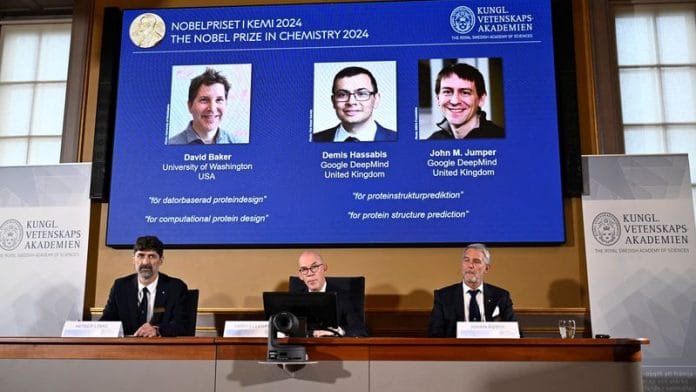Stockholm: U.S. Scientists David Baker and John Jumper and Britain’s Demis Hassabis won the 2024 Nobel Prize in Chemistry, the award-giving body said on Wednesday, for their work on understanding the structure of proteins.
Half the prize was awarded to Baker “for computational protein design” while the other half was shared by Hassabis and Jumper “for protein structure prediction”, said the Royal Swedish Academy of Sciences, which makes the award.
Baker is a professor at the University of Washington, in Seattle, while Hassabis is CEO of Google DeepMind, the AI research subsidiary of Google, where Jumper also works as senior research scientist.
Hassabis and Jumper utilised artificial intelligence to predict the structure of almost all known proteins, while Baker learned how to master life’s building blocks and create entirely new proteins, the award-giving body said.
“One of the discoveries being recognised this year concerns the construction of spectacular proteins,” the academy said in a statement. “The other is about fulfilling a 50-year-old dream: predicting protein structures from their amino acid sequences.”
The prize, widely regarded as among the most prestigious in the scientific world, is worth 11 million Swedish crowns ($1.1 million).
“I’m really excited about all the ways in which protein design makes the world a better place in health, medicine and really, outside technology,” Baker said by phone to the press conference announcing the prize.
In 2003, Baker was able to use amino acids, often described as life’s building blocks, to design a new protein that was unlike any existing one, the academy said.
That opened the door to the rapid creation of different proteins for uses in areas such as pharmaceuticals, vaccines, nanomaterials and even tiny sensors.
“He developed computational tools that now enable scientists to design spectacular new proteins with entirely novel shapes and functions, opening endless possibilities for the greatest benefits to humankind,” Heiner Linke, chair of the Nobel Committee for Chemistry, said of Baker’s contribution.
In 2020, Hassabis and Jumper presented an AI model called AlphaFold2. With its help, they have been able to predict the structure of virtually all the 200 million proteins that researchers have identified, the academy said.
THIRD PRIZE ANNOUNCED
The third award to be handed out every year, the chemistry prize follows those for medicine and physics announced earlier this week.
The Nobel prizes were established in the will of dynamite inventor and wealthy businessman Alfred Nobel and are awarded to “those who, during the preceding year, shall have conferred the greatest benefit to humankind”.
First handed out in 1901, 15 years after Nobel’s death, it is awarded for achievements in medicine, physics, chemistry, literature and peace. Recipients in each category share the prize sum that has been adjusted over the years.
The economics prize is a later addition funded by the Swedish central bank.
Chemistry, close to Alfred Nobel’s heart and the discipline most applicable to his own work as an inventor, may not always be the most headline-grabbing of the prizes, but past recipients include scientific greats such as radioactivity pioneers Ernest Rutherford and Marie Curie.
Last year’s chemistry award went to Moungi Bawendi, Louis Brus and Aleksey Ekimov for their discovery of tiny clusters of atoms known as quantum dots, widely used today to create colours in flat screens, light emitting diode (LED) lamps and devices that help surgeons see blood vessels in tumours.
Alongside the cash prize, the winners will be presented a medal by the Swedish king on Dec. 10, followed by a lavish banquet in Stockholm city hall.
($1 = 10.3632 Swedish crowns)
(Reporting by Johan Ahlander, Niklas Pollard and Marie Mannes in Stockholm; additional reporting by Terje Solsvik in Oslo, Anna Ringstrom in Stockholm and Martin Coulter in London; Editing by Alex Richardson)
Disclaimer: This report is auto generated from the Reuters news service. ThePrint holds no responsibilty for its content.






